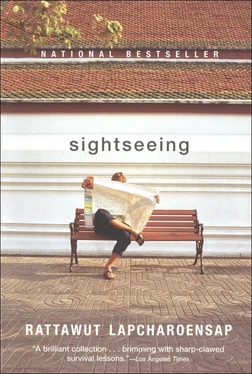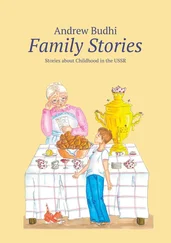XVIII
The days in the hospital were long. I don’t think Mama slept the whole four days. She sat in an armchair beside the gurney, staring back and forth between Papa and the window overlooking the hospital parking lot. I tried to talk to her, but she’d only nod at me or shake her head, as if I’d uttered nothing but questions. She didn’t eat. I would get food from the cafeteria, but she would only nibble at it courteously before setting down the tray. She never mentioned the fact that I’d hit her; after a while, her silence seemed punishment enough. Noon came by to pick me up for school every morning, but I couldn’t bring myself to leave Papa’s side, and Mama didn’t seem to mind.
Papa woke up every so often. He never said a word. He would look at us, stare at the ceiling, click his morphine drip, and just wait for sleep to come again. We both tried to speak to him, but he’d simply turn over onto his side. Doctors in neatly pressed lab coats would come into the room. The infection was beginning to heal, they said on the second day, which explained the stench at night.
Nurses came in twice a day to change Papa’s bandage and clean his wound. That was the only time Papa ever made a sound. Mama would stand and look calmly over the nurses’ shoulders. I didn’t want to see the wound; it was enough to see the nurses wince.
We received some flowers and cards, but nobody came to visit. It was as if people were afraid that they might be putting themselves in harm’s way, as though Papa’s unfortunate fate was a contractible disease.
On the evening of the second day, Noon came by and we climbed onto the hospital roof. She’d brought iced coffee and cigarettes. The town stretched below us; on the horizon, we could see the hills that separated us from our neighbors to the north. I tried to find our property, but I couldn’t see much beyond the rubber grove on the eastern side of the roof. It occurred to me then that Mama and I had not gone back to the house since we’d left. I wondered if the strays were smart enough to notice our absence. Perhaps they would go to the chicken house first and then, upon finding no sustenance there, move to the house itself.
Noon told me she’d seen Little Jui around town driving Papa’s Mazda.
“It’s a crime, Ladda,” Noon said. “It’s an abomination what they did to your father. You should report it to the police.”
I shook my head. I reminded Noon that the chief of our esteemed police department was Big Jui’s brother-in-law. Given the way things worked in our town, Papa’d get arrested for having his own ear cut off. Papa lost, I reminded Noon. He bet more than he could afford. The police would probably say that an ear was the least Papa could give for a bet he never meant to pay. “Still,” Noon replied, sighing, “that doesn’t make it right, Ladda,” and I said she should know by now that we were living in a world where words like that didn’t mean a thing: right or wrong, left or right, up or down, inside or outside — our people didn’t speak that kind of language.
We took Papa home on the fourth day. Miss Mayuree sent one of her men over with the sedan and for the first time I did not feel any rancor toward her. Miss Mayuree told Mama that she could keep to her old quota for the time being, eight hundred bras a month. Mama thanked her once again. The nub on Papa’s head had stopped bleeding now, though there remained a large square bandage taped over the side of his scalp. When we got home, Mama sat Papa on the front porch, cleaned out the wound, changed the bandage. Papa grimaced as she swabbed the wound with alcohol, but still he didn’t say a thing. The doctors had advised vigilance — they said the infection might spread. I couldn’t bear to look at Papa’s wound, so I carried my bags to my bedroom and left Mama and Papa on the porch.
For the first time in a while, I felt calm. It was as if I’d expended all my anger that first night in the hospital, hitting Mama, screaming at her. Nor did I feel any anguish for what happened to Papa. What happened happened, I decided, and I could see no use in wishing that it didn’t. The doctors told us that Papa would still be able to hear out of both ears — only the cartilage had been taken — which really was the most anybody could hope for, they said. They made Little Jui’s barbarity seem perversely generous.
At breakfast the next morning, Papa spoke for the first time. Over porridge, he said, “This is delicious,” and Mama and I looked at him astonished, for I think in some ways we’d been preparing for the possibility that he might never speak again.
“What?” Papa said, grinning at us both. “You guys don’t think it’s delicious?”
We slowly started speaking again. In steady increments, there was talk in the house once more. There was kindness. There was generosity. There was laughing and smiling and even, at times, delight. Mama and Papa decided to plant a garden in the yard — zinnias and azaleas and birds-of-paradise and morning glories. I’d come home from school and see them out there bent over the earth together, the sun casting its long rays, and if it hadn’t been for that square bandage over Papa’s missing ear, you would’ve thought we were as normal as anybody else. The strays would emerge at night to inspect the garden, pause to sniff the budding flowers. And if it hadn’t been for that chicken house, with its empty coops and bags of premium feed lining the mud walls, you never would’ve guessed that my father once fought chickens as though nothing else mattered.
I’d occasionally see Little Jui in town with his bodyguards and Ramon. I’d walk the other way. He never bothered me again. It was as though he’d decided to move on to other, more entertaining game. I’d heard that many of the men had stopped going to the cockpit after what Little Jui did to my father. It was the end of cockfighting in our town. Dog racing was the new game: Saksri Bualoi had retired undefeated as the welterweight champion of the world and opened up a world-class dog track in his hometown. It was something else, the rumormongers said, to sit there in the stands and eat marinated porkballs and drink fifths of rye and watch those beautiful dogs run.
XIX
We went back to the hospital for a checkup later that month. Everything’s fine, the doctor told us, peering sternly into the bandage. No infection. Good progress all around. He recommended a prosthetic for Papa. “It will be easy,” he said. “All we need to do is make a mold of your other ear.” He pulled out a few dummies from a leather suitcase — an ear, a nose, a shin, a hand, a foot, all made from some complicated sounding substance, all tinted the same pinkish hue. The doctor put the artificial ear in Papa’s hand. Papa fingered it and said, “Why, it’s just rubber, Doctor,” and the doctor shrugged as if he couldn’t be bothered to explain again. “I don’t need a rubber ear,” Papa said, laughing, handing the prosthetic back. “Thanks but no thanks. Lots of ugly people in this world, Doctor. And they’re no less ugly for having two ears on their heads.” The doctor nodded, looked at his watch. Before we left, he took off Papa’s bandage. I looked at Papa’s wound for the first time: the bulging, translucent half-moon of scar tissue; the short brown notch which the doctor called the tragus; the small hole that made me think of some flesh-eating creature burrowing itself deep into the side of Papa’s head. Papa walked to the mirror. “It’s not so bad,” I said, and Papa smiled at me appreciatively.
That night, I went into the chicken house after dinner. I hadn’t been in there since the day I told Papa about Little Jui coming to take the Mazda. It still smelled strongly of chicken shit and stale urine. A few sparrows had made their home in the thatch roof, getting fat off the remaining bags of chicken feed. They fluttered around as I entered the chicken house. I didn’t light the lantern. I just sat down in the dark and listened to the sounds around me: the hum of Mama’s sewing machine on the front porch; Papa watering the garden, long jets of water beating an irregular rhythm against the soil; the sparrows chirping overhead; the cicadas singing in the trees; the strays lifting their voices in turn to join that insect orchestra. I sat there for a long time, until Mama and Papa went inside. Mama turned on the kitchen light and the chicken-house windows cupped its yellow rays. I watched her shadow moving on the chicken-house floor. Soon, she turned off the light and I was in darkness again. I heard my parents murmuring and then I heard their bedroom door shut. I could sense nothing then of my parents, nothing of the house, just the noises the animals made. After a while, even the animals seemed to go to sleep, as though all the world had decided to turn in with my parents for the night, and I held my breath because it seemed the only sound left in the world and all around me then was an extraordinary silence. It made me feel light, that silence, as if I might float to the ceiling, as if I might be able to open my arms, flap them, and fly with the sparrows. I don’t know how long I sat there holding my breath in the dark, but I thought then of how loud the world could be, so much clatter and noise, and of how lovely and rare was a moment like this when one need not listen to anything at all.
Читать дальше











